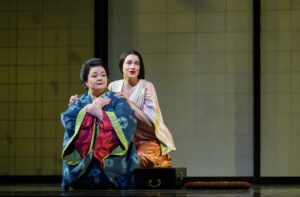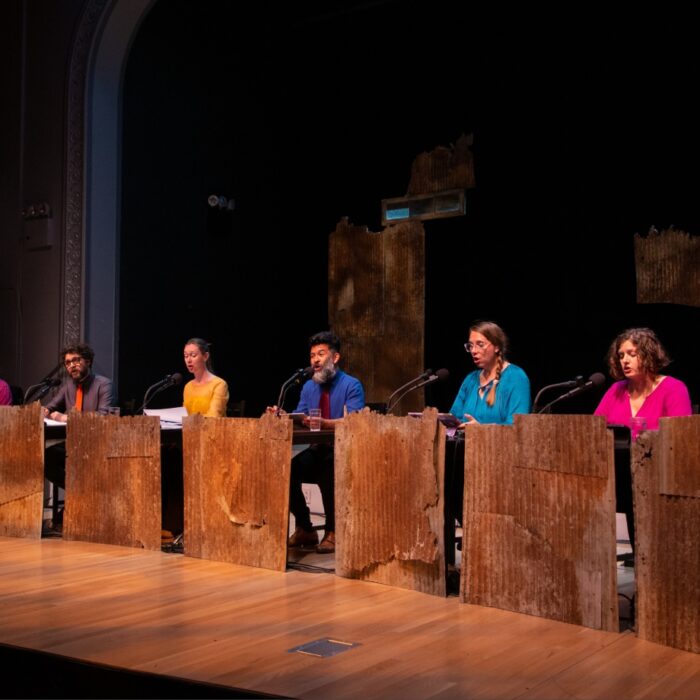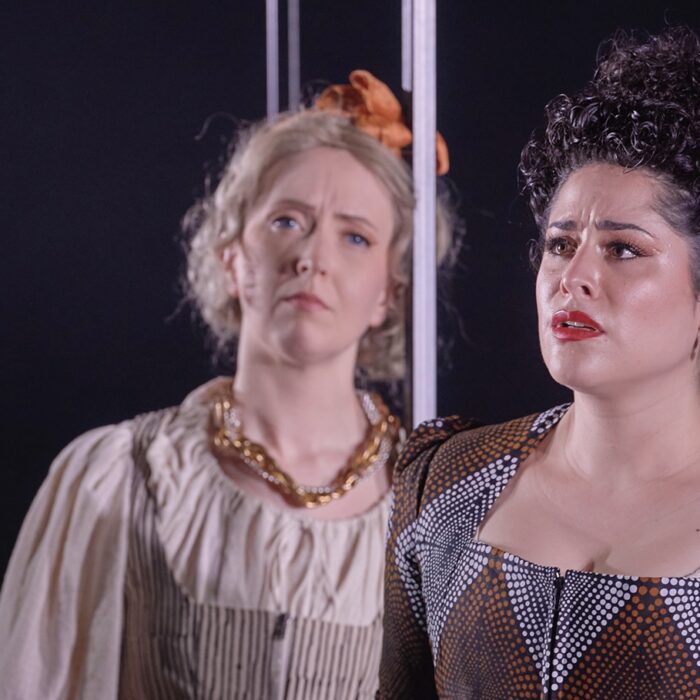
Metropolitan Opera 2023-24 Review: Madama Butterfly
Asmik Grigorian Provides Mixed Star Turn in Puccini Classic
By Alexandra Svokos(Photo: Jonathan Tichler / Met Opera)
The Metropolitan Opera has been performing Anthony Minghella’s sumptuous production of “Madama Butterfly” for so long now it’s almost a comfort watch – were it not for the unerringly bleak plot – in its familiarity. It’s become a staple of New York’s stages since ads showcasing the flowing colors of the staging blanketed the city back in 2006.
The excitement of a new run, then, doesn’t come from the production itself, but rather from the performers. And this spring, the Met is bringing the heat with the highly anticipated company debuts of Asmik Grigorian and Jonathan Tetelman. Tetelman, the American tenor, made his company debut earlier this year in “La Rondine,” with the New York Times declaring him a “Puccini specialist.” Metropolitan Opera audiences, though, had to wait a bit longer for his role debut as Lt. B.F. Pinkerton as he was ill on his scheduled first night.
Struggling Stars
No matter – Grigorian alone was enough cause for debut celebration, and she proved why with her performance Friday night, at least in the obvious potential of her voice. The soprano from Lithuania was a commanding presence from her first entrance, marching up Minghella’s famous abstract hill created by a heavily sloped stage. Even wearing a veil, you were immediately drawn to Grigorian from the power of her voice and presentation.
Her voice has a rich timbre and darkly colored sound. Grigorian, along with an always-reliable Elizabeth DeShong as Suzuki, easily projected above the enormous sound of the Met orchestra, although Grigorian had some early slight wails in her upper register that mostly faded as she warmed into the performance. Her legato phrasing in “Un bel di” was beautiful.
For his part as a last-minute Pinkerton, American tenor Chad Shelton was dutiful. He had a nice, pleasant sound in his mid and upper register, and excellent diction, just some trouble getting heard in louder orchestral moments. Similarly, Tony Stevenson as the marriage broker Goro and Lucas Meachem as Sharpless, the American consul, did fine jobs with their vocal performances, along with a brief appearance by a solid Jeongcheol Cha as the Prince Yamadori.
Altogether, the vocal performances weren’t spectacular, but they did what they had to do, with some very pretty, memorable moments. The bigger issue, though, was the acting. Grigorian’s commanding entrance introduced a Cio-Cio-San in power, controlling the women who accompanied her up the hill like a queen bee. She played the role not as a shy or immature 15-year-old bride, but one who chose her destiny and knew what she was doing, with headstrong pride. It was an interesting dramatic choice – but that might be too generous a characterization. Was Grigorian playing the most stoic teenager you’ve ever seen – or was she just a stiff actor?
Shelton did her no favors as he, too, stood stiffly for most of the opera. Given that he stepped into the role that day, you could understand that perhaps he felt uncomfortable sweeping Grigorian into his arms or pawing at her like the overzealous cad Pinkerton can be. But it all created an uncomfortable, frankly boring garden scene. The wedding night scene seals the emotional argument of the opera, and what we saw was a deadly serious bride and a tense groom. Now, tension and discomfort in this scene is not unwelcome, especially in modern productions where we can acknowledge the moral depravity of the situation, but here, it seemed less like a dramatic decision and more like a lack of direction – all nervousness, no energy.
Unfortunately for these singers, conductor Xian Zhang, who made her company debut with an earlier run of “Butterfly” this season, chose to slow down the orchestra in the emotional moments, including “Un bel dì.” With certain singers, that’s not a bad decision: it gives them space to fill with feeling. However, on Friday night, it just meant even less energy hitting the audience. Despite this, overall Zhang was a strong, passionate conductor, especially bringing pizzazz to the dramatic conversational scenes.
The Heart of the Matter
With Cio-Cio-San and Pinkerton lifeless, the emotional core instead was filled by DeShong as Suzuki and Meachem as Sharpless. It was a relief every time DeShong was onstage, with her strong voice and dramatic presence, creating a fully realized Suzuki who cared for Butterfly but also was frustrated by her stubbornness. Meachem, while not as vocally powerful as DeShong, was the voice of morality, imbuing his character with apparent, genuine concern and outrage over Pinkerton’s treatment of the teenage geisha.
The Met orchestra, as always, was fabulous, particularly in the woodwinds and strings for this performance. And Minghella’s staging continues to show its worth as one of the most visually arresting productions on the Met stage – especially in Peter Gelb’s age of stark greys.
Grigorian has a clearly wonderful instrument that gives her the potential to create moments of magic onstage – but she needs stage direction to make that happen. Her literally grounded performance gave Cio-Cio-San the appearance of being headstrong and stubborn, refusing to move on from her decision to marry Pinkerton. That made her character’s final act feel like she was enacting revenge on Pinkerton, making it an impetuous reaction to an unworthy man. It was interesting, but it didn’t pack the emotional punch this opera can bring.



